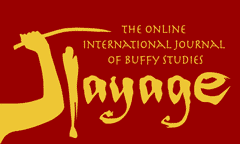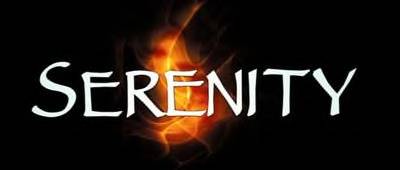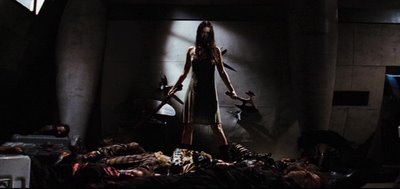Slayage Conference Report - pt. II
 What people consider sin, I consider human characterstics - Joss Whedon
What people consider sin, I consider human characterstics - Joss Whedon[In Serenity] a world without sin is a world of death - Rhonda Wilcox
Another great panel that I attended was by the convenor of the conference, Rhonda Wilcox. The title of her paper was, '"I Do Not Hold to That": Joss Whedon and Original Sin' and I'll briefly outline some of the points she made.

In Serenity, the character of River and the Operative are basically weapons (of mass destruction, as others have noted) and are both products of the Alliance's manipulation. The connection between the Operative/River and the Alliance's meddling is first illustrated in the opening flahsback-within-recording where the frame is paused while showing Simon rescuing his sister River from the Alliance.
 While focusing on the frozen picture of River and the Operative passes through the holographic image, his face replaces hers.
While focusing on the frozen picture of River and the Operative passes through the holographic image, his face replaces hers.Wilcox made the point of how the film suggests that knowledge and consciousness can be seen as forms of original sin. The Operative asks each of his victims, 'Do you know what your sin is?', and according to his philosophy, the punishment for sin is death. This suggests an encouragement of choice and agency (which he himself hasn't even been allowed), but is undercut by how he physically disables them so that they make the sacrifice/restitution by falling to their death on a sword (his, not their own). It is also worth noting that the name of the Captain of the starship Serenity is Malcom ('Mal') Reynolds, and that the word 'mal' in Spanish means sin, bad, hurt, injury.
The Operative: Do you know what your sin is?
Capt. Malcom Reynolds: Aw, Hell, I'm a fan of all seven... but right now, I'm gonna have to go with Wrath.
 The scene where River first goes berserk after viewing the video screen has allusions to Orson Welles's Citizen Kane, and 'Rosebud'. The close-up shot of River whispering 'Miranda' and the lips of Charles Foster Kane uttering 'Rosebud' both suggest a loss of innocence and downward spiral toward destruction - as is certainly seen when the Serenity crew discover the nature and origins of Miranda and associations with the Reavers. These two terms are also used as the focus of a mystery that drives the plot and challenges the viewer to decipher. The manipulation of the people on Miranda by the Alliance also suggests that compelling people toward Paradise only results in apathy and loss of humanity. By deconstructing Paradise, ala John Milton, Whedon's film is resistant to the notion of an 'ideal' society, favoring instead one that is governed by choice, but includes the inevitable flaws and mistakes resulting from personal agency. From this perspective it also seems to oppose the colonial visions of manifest destiny that is so often supported in science fiction.
The scene where River first goes berserk after viewing the video screen has allusions to Orson Welles's Citizen Kane, and 'Rosebud'. The close-up shot of River whispering 'Miranda' and the lips of Charles Foster Kane uttering 'Rosebud' both suggest a loss of innocence and downward spiral toward destruction - as is certainly seen when the Serenity crew discover the nature and origins of Miranda and associations with the Reavers. These two terms are also used as the focus of a mystery that drives the plot and challenges the viewer to decipher. The manipulation of the people on Miranda by the Alliance also suggests that compelling people toward Paradise only results in apathy and loss of humanity. By deconstructing Paradise, ala John Milton, Whedon's film is resistant to the notion of an 'ideal' society, favoring instead one that is governed by choice, but includes the inevitable flaws and mistakes resulting from personal agency. From this perspective it also seems to oppose the colonial visions of manifest destiny that is so often supported in science fiction.**Note: This is an extremely truncated account of Wilcox's excellent talk. I'll keep my eyes out for an online version of it to link to in the future.
[Link to an abstract of Rhonda Wilcox's talk]
Tagged under:
TV, Film, Entertainment
Labels: Critical Studies, Film, Joss Whedon, Sci-fi, Serenity, Slayage, Television


0 Comments:
Post a Comment
<< Home